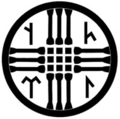Kut (mythology)
According to Turkic belief, Kut (also spelled Qut, Old Turkic: 𐰴𐰆𐱃, romanized: Qut), is a kind of force vitalizing the body. Through Kut, humans are connected with the heavens. When Kut ends, the person dies. Further, the sacred ruler is believed to be endowed with much more Kut than other people, thus the heaven would had appointing him as the legitimate ruler.[1][2] Turkic Khagans claimed that they were "heaven-like, heaven-conceived" and possessed qut, a sign of the heavenly mandate to rule.[3] Rulers of the Uyghur Khaganate were entitled "idiqut", meaning "sacred good fortune".[4] The word "suu" is the Mongolian equivalent of Kut.[5] It was believed that if the ruler had lost his qut, he could be dethroned and killed. However, this had to be carried out without shedding his blood. This was usually done by strangulation with a silk cord.[6] This custom of strangling continued among the Ottomans.[6]
| Part of a series on |
| Tengrism |
|---|
 |
| A Central Asian–Eurasian Steppe and partly Siberian–East Asian religion |
| Supreme deity |
| Other deities/spirits |
| Movements |
| Related movements |
| People |
| Priests |
| Scriptures |
| Holy places |
| Toponyms |
| Related conceptions |
|
|
Name
Kutlug is frequently used and well-known personal Uyghur name. It was also the name of first rulers of Second Turkic Khaganate (Ilterish Qaghan) and Uyghur Khaganate (Kutlug I Bilge Kagan).[7]
Reference
- JENS PETER LAUT Vielfalt türkischer Religionen p. 25 (German)
- Carter Vaughn Findley The Turks in World History Oxford University Press 2004 ISBN 9780199884254
- Peter B. Golden, (2010) Central Asia in World History, p. 43-44
- Rahmat, (1964, 150-57)
- Mosaert and Cleave, (1962, 17-23)
- David Sneath, Christopher, (2010), Twentieth century Mongolia, p. 76
- Susan Whitfield, Life along the Silk Road: Second Edition, p. 216